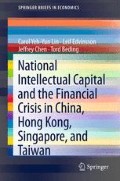Abstract
This chapter reports activities after 2010, a timeline regarded as the aftermath of the 2008 global financial crisis which was formally announced to be over at the end of 2009 (Kehoe 2010; OECD 2010). Although some European countries were still in sovereign debt trouble after 2010 (Greece requested another bailout in early 2012 and Spain asked for external financial assistance in June 2012), we use 2010 as a cutoff point in order to be consistent with the reports of other country clusters in this booklet series. From the statistics introduced in Chapter 3, situations of these four economies in 2010 have clear rebounds under the support of each individual economy’s stimulus efforts and the gradual revival of global demands.
As of mid-2012, the Asian economy as a whole has recovered from the financial crisis. The chief of the Asian Development Bank said, “The global economic slowdown will affect Asia this year (2012) but the region will remain the economic powerhouse of the world, led by China, India and Indonesia…regional and domestic demand in Asia are still fairly robust” (Kuroda 2012). At the same time, the IMF was gloomy about the world economy and cut its forecast for global economic growth for 2012 to 3.3 % from 4 %, because of the likelihood of a mild recession in Europe (Kuroda 2012). Affected by European market slowdown—China’s major export destination, there was a prediction that China’s growth would slip to 8.4 % in 2012 (Debnath 2012). However, Asia’s economic development relies on China more and more as it has become the top export destination for many of its neighbors, such as the other three economies reported in this volume.
In what follows, in the sequence of China, Hong Kong, Singapore, and Taiwan, we briefly describe what had happened in each individual economy after 2010 with some prior reasons.
Access this chapter
Tax calculation will be finalised at checkout
Purchases are for personal use only
References
Adam S (2010) China to exceed U.S. by 2020, Standard Chartered says. Bloomberg.
Asher MG (2010) Singapore: economy bounces back, but…? East Asia Forum. Retrieved from http://www.eastasiaforum.org/2010/12/31/singapore-economy-bounces-back-but/
Bradsher K (2011) China, driver of world economy, may be slowing. The New York Times. Retrieved from http://www.nytimes.com/2011/09/24/business/global/chinas-economic-engine-shows-signs-of-slowing.html?pagewanted=all
Central Intelligence Agency (CIA) (2012) The world factbook. U.S.A. Central Intelligence Agency. Retrieved from https://www.cia.gov/library/publications/the-world-factbook/geos/ch.html
Cheng YH, Kao YL (2010) Taiwan’s economy forecast to grow 4.81% in 2010. The China Post. Retrieved from http://www.chinapost.com.tw/business/asia/b-taiwan/2010/01/26/242417/Taiwans-economy.htm
Cooke MT (2012) Taiwan’s economy: recovery with Chinese characteristics. The Brookings Institution. Retrieved from http://www.brookings.edu/opinions/2009/11_taiwan_economy_cooke.aspx
Debnath A (2012) Asian economies to slow in 2012 but avoid slump. The Reuters. Retrieved from http://in.reuters.com/article/2012/01/19/asia-economy-poll-idINDEE80I05S20120119
Economic Forum (2010) Hong Kong 2011 economic outlook. Economic Forum – Global Economic Analysis & Reports. Retrieved from http://www.hktdc.com/info/mi/a/ef/en/1X078D1W/1/Economic-Forum/Hong-Kong-2011-Economic-Outlook-Living-With-Higher-Prices.htm
Economic Forum (2011) Hong Kong consumer confidence experiences slight dip after steady increment for eight quarters. Economic Forum – Global Economic Analysis & Reports. Retrieved from http://www.hktdc.com/info/mi/a/ef/en/1X07EDQ7/1/Economic-Forum/Hong-Kong-Consumer-Confidence-Experiences-Slight-Dip-After-Steady-Increment-For-Eight-Quarters-Br-Consumer-Confidence-Ended-2010-At-99-Points.htm
Economy Watch (2010a) The Chinese economy. Economy Watch. Retrieved from http://www.economywatch.com/world_economy/china/
Economy Watch (2010b) Singapore economy. Economy Watch. Retrieved from http://www.economywatch.com/world_economy/singapore/?page=full
Fleet JD (2010) Can China manage its economy? The Diplomat. Retrieved from http://the-diplomat.com/2010/01/21/can-china-manage-its-economy/
Global Edge (2012) Taiwan: economy. Michigan State University. Retrieved from http://globaledge.msu.edu/Countries/Taiwan/economy in June 2012
Global Finance (2011) Taiwan roundtable: economy & business, moderated by Joseph Giarraputo. Global Finance. Retrieved from http://www.gfmag.com/archives/137-april-2011/11181-roundtable-taiwans-economic-and-business-outlook.html#axzz1rOjkLER0
Heilmann S, Schmidt D (2010) China country report. In Bertelsmann Stiftung (ed) Managing the crisis. A comparative assessment of economic governance in 14 economies. Bertelsmann Stiftung, Gütersloh
Herd R, Koen V, Noord P (2011) China’s emergence as a market economy: achievements and challenges. OECD contribution to the China Development Forum 20–21 March 2011. Beijing.
Hong Kong Government (2009, 4th Q) Outlook for the Hong Kong economy in 2010. Retrieved from http://www.hkeconomy.gov.hk/en/pdf/09q4_outlook.pdf
International Monetary Fund (IMF) (2011) China economic outlook. IMF Resident Representative Office, China. Retrieved from http://www.imf.org/external/country/CHN/rr/2011/092611.pdf
Kehoe T (2010) The current financial crisis in Spain: what should we learn from the great depressions of the twentieth century? University of Minnesota and Federal Reserve Bank of Minneapolis, 18th Barcelona Lecture. Barcelona G.S.E. and Banc Sabadell, Feb 2010.
Kuroda H (2012) Asia to power world economy in 2012: ADB chief. The Economic Times. Retrieved from http://economictimes.indiatimes.com/news/economy/foreign-trade/articlelist/1200949414.cms
Liu HC, Wu S (2011) Taiwan to be free of ‘double-dip recession’: CEPD chief. Taiwan News. Retrieved from http://www.taiwannews.com.tw/etn/news_content.php?id=1735689
Ministry of Trade and Industry Singapore – MTI (2011) MTI forecasts growth of 5.0% in 2011 and 1.0–3.0% in 2012. MTI Singapore Press Release. Retrieved from http://online.wsj.com/article/SB10001424052970204720204577132040862931660.html
OECD (2008) China’s outward foreign direct investment. OECD Investment. Retrieved from http://www.oecd.org/dataoecd/28/10/40283257.pdf
OECD (2010) 2010 Economic Surveys Portugal, OECD. Retrieved from http://www.oecd.org/dataoecd/34/20/46062172.pdf
Schwab K (ed) (2011) The global competitiveness report 2011–2012. World Economic Forum, Geneva
Shannon K (2010) Singapore’s economy leads Asia’s rebound with record-breaking 2010 growth. Money Morning. Retrieved from http://moneymorning.com/2010/07/15/singapores-economy/
Thangavelu S (2009) Riding the global economic crisis in Singapore. East Asia Forum. Retrieved from http://www.eastasiaforum.org/2009/01/05/riding-the-global-economic-crisis-in-singapore/
Tuan C, Ng LFY (2011) Beyond the financial crisis: Hong Kong-metropolis’s evolution and economic integration with China. Department of Decision Sciences and Managerial Economics, Faculty of Business Administration. The Chinese University of Hong Kong. Retrieved from http://ccas.doshisha.ac.jp/eng/Econference/econfpdf/26th%20Conference%20of%20the%20American%20Committee%20for%20Asian%20Economic%20Studies/TuanNg.pdf
US News (2008) China’s economy is on track to surpass the U.S. by 2035. US News. Retrieved from http://www.usnews.com/news/articles/2008/07/08/chinas-economy-is-on-track-to-surpass-the-us-by-2035
Venkat PR (2011) Singapore economy expanded 4.8% in 2011. The Wall Street Journal. Retrieved from http://online.wsj.com/article/SB10001424052970204720204577132040862931660.html
Author information
Authors and Affiliations
Rights and permissions
Copyright information
© 2013 The Author(s)
About this chapter
Cite this chapter
Lin, C.YY., Edvinsson, L., Chen, J., Beding, T. (2013). Beyond the 2008 Global Financial Crisis. In: National Intellectual Capital and the Financial Crisis in China, Hong Kong, Singapore, and Taiwan. SpringerBriefs in Economics, vol 8. Springer, New York, NY. https://doi.org/10.1007/978-1-4614-5984-2_4
Download citation
DOI: https://doi.org/10.1007/978-1-4614-5984-2_4
Published:
Publisher Name: Springer, New York, NY
Print ISBN: 978-1-4614-5983-5
Online ISBN: 978-1-4614-5984-2
eBook Packages: Business and EconomicsEconomics and Finance (R0)

